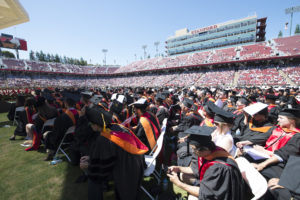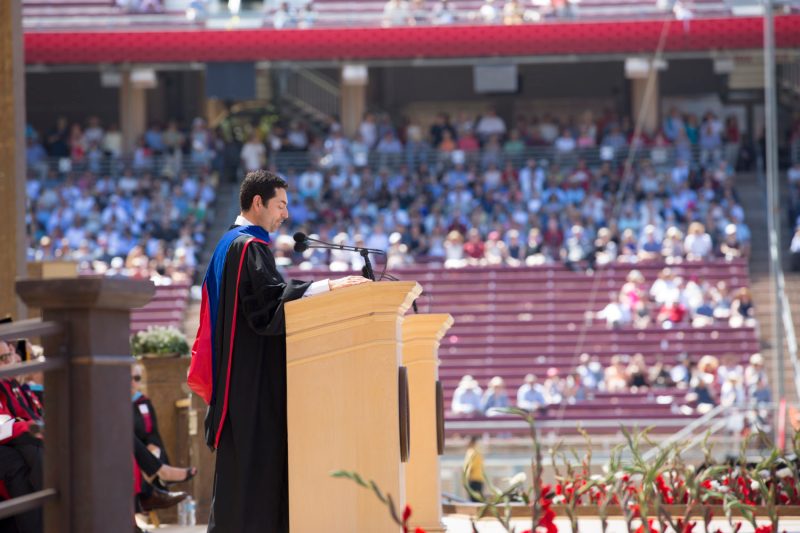At Stanford’s 126th Commencement on Sunday, Mariano-Florentino Cuéllar Ph.D. ’00, associate justice of the Supreme Court of California and a Stanford alumnus, urged graduates to be cognizant of all those who have contributed to societal progress before them and to use their “good fortune” for the benefit of others.
Cuéllar began his speech at Stanford Stadium by sharing his own “hip hop musical” on former president Franklin Delano Roosevelt, explaining that his daughter said Lin-Manuel Miranda’s 2016 commencement speech at the University of Pennsylvania could not be topped.
He then shared three reflections, advising graduates to remember the history they have inherited, to always try to bridge divides and to recognize the value and variety of public service.

Cuéllar reminded graduates of the hard work that had to take place in order for them to be where they are today, pointing to the efforts of farmers who grow food, people who maintain clean water and others who provide the means for people to enjoy their lives.
He highlighted the great societal change, accumulated over many years, that audience members have benefited from.
“Think of the world as it stood when Franklin Delano Roosevelt was a baby,” he said, noting that nearly 40 percent of children around the world died before the age of five at in that era. Today, that figure has dropped to 4 percent.
“You are heirs to the gift of progress,” he said.
Next, Cuéllar called on his listeners to work to close gaps “between people who disagree or even want to fight, between ideas difficult to reconcile, or simply between ourselves and those we encounter… with starkly different lives.”
He emphasized the need to take note of and learn from the people at the edge of one’s awareness and encouraged people to speak up in order to participate in the “shared effort of separating fact from fiction.”
In his last reflection, on public service, Cuéllar urged graduates to protect “civic architecture.” He gave examples of ways that they could share their good fortune, such as engaging with democracy by volunteering with campaigns that they believe in, something Cuéllar himself did.
Cuéllar is a veteran of public service. After getting his doctorate in political science at Stanford, he taught law at the University and focused on addressing worldwide issues such as poverty and health disparities as head of Stanford’s Freeman Spogli Institute. He has also served in the administrations of former presidents Bill Clinton and Barack Obama, tackling topics ranging from immigration to refugees to equal pay.
At the end of his speech, Cuéllar recommended that graduates go home and write letters to their future selves defining their core values and their dreams.
He said that no matter what challenges people pursue, from battling climate change to making sure technology does not overpower people’s lives, he hoped the audience would share their gifts and keep their peripheral vision sharp — an allusion to his earlier advice to look out for those who often escape our perception.
“Take what’s at the edge of your awareness seriously, and it becomes your own edge – your advantage,” Cuéllar said. “Your power to see the dangers others face… Your means to engage the world and each other as I’ve seen you do.”
Contact Anne-Marie Hwang at amhwang ‘at’ stanford.edu.
